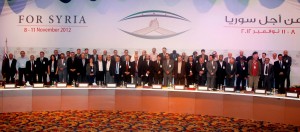 Beirut, Lebanon — Fledgling efforts to promote peace talks in the Syrian conflict appear to have stalled, even as the death toll rises daily and the rebellion nears its second anniversary.
Beirut, Lebanon — Fledgling efforts to promote peace talks in the Syrian conflict appear to have stalled, even as the death toll rises daily and the rebellion nears its second anniversary.
The major exile opposition group, irate over what it calls a “shameful” global silence about the bloodshed, has announced that it will not attend several planned international gatherings on Syria, spurning invitations to visit Russia and the United States. Both nations have said that they favor negotiations as a means to end the violence in Syria.
The National Coalition of Syrian Revolutionary and Opposition Forces has also opted to “suspend” its participation in a meeting in Rome next month of the so-called Friends of Syria alliance, which includes the United States and dozens of other nations that have bankrolled the opposition.
The coalition’s protest moves — combined with its demand that any talks lead to the ouster of Syrian President Bashar Assad — would seem to scuttle already faint hope of negotiations. The Syrian regime has categorically rejected any talks that mandate Assad’s removal from power.
The opposition bloc assailed what it called international inaction in the face of recent attacks by government-launched Scud missiles on the northern city of Aleppo.
“Hundreds of helpless civilians are being martyred due to [being] bombed with Scud rockets,” the coalition said in a statement Friday.
Unverified video said to be from an Aleppo district hit by a Scud on Friday showed residents desperately trying to find survivors in the wreckage of a flattened building. Elated rescuers finally pulled a dazed boy in a blue shirt from the debris. The attack killed 29 civilians, 19 of them children, according to the Syrian Observatory for Human Rights, a Britain-based opposition group.
The dissidents’ denunciations of what they characterize as global dithering seem designed to pressure the West to acquiesce to demands for stepped-up arms deliveries to the rebels. But many experts see such an outcome as unlikely.
“The opposition has every reason to be frustrated with an international community that has endlessly expressed concern about the killing while doing virtually nothing to bring it to an end,” said Peter Harling, an analyst with the International Crisis Group. “But in international affairs, sulking rarely is a successful strategy.”
The White House has resisted arming the rebels, fearing that more weaponry may only exacerbate the chaos in Syria. Israel, which shares a border with Syria, and the United States are also concerned that sophisticated weaponry, such as shoulder-fired antiaircraft missile launchers, would fall into the hands of Al Qaeda-linked extremists who have emerged as key combatants in the rebel ranks.
Russia, a close ally of Assad, has been trying to broker peace talks in conjunction with the Arab League. Syrian Foreign Minister Walid Moallem is scheduled to lead a delegation to Moscow this week to discuss possible negotiations.
Russian authorities have also extended an invitation to visit Moscow to Moaz Khatib, who heads the opposition coalition. Last month, Khatib stunned many when he said he was ready to meet with Assad’s men to talk peace, opening a potential window to a negotiated settlement.
Russia and the United States applauded Khatib’s proposal. But many in the exile-led coalition balked at his suggestion, and the group has since moved to torpedo the solo initiative.
Last week, the coalition reiterated its position that any talks must result in Assad’s removal. In its latest declaration, the opposition group also excoriated Russia, Assad’s ally and chief arms supplier, as “morally and politically responsible” for Syria’s bloodshed. The statement would seem to rule out Moscow as peace broker.
Despite the muddled scenario, the opposition coalition says it aims to proceed with plans to name a provisional government to oversee rebel-held areas of Syria. How that idea will play out remains unclear.
The exile leadership holds limited sway over the scores of militias that are now the de facto rulers of vast swaths of “liberated” Syria. Rebel commanders in Syria often openly scoff at the exile opposition leadership, saying members spend too much time at five-star hotels without accomplishing anything.
The coalition’s decision to spurn international peace efforts may be meant in part to boost the group’s credibility with rebel chiefs leery of the West and opposed to any kind of deal with Assad.
“We are under huge pressure from our people inside Syria, because they are not seeing any tangible results from our discussions with the international community,” Anas Abda, an opposition coalition member, told the BBC on Saturday.
The Syrian conflict, which began with antigovernment street protests in March 2011, has cost almost 70,000 lives, according to the United Nations. The war has also battered the nation’s economy and infrastructure and forced about 1 million Syrians to flee the country. An additional 2 million in Syria have been displace from their homes.
LA Times

Leave a Reply
You must be logged in to post a comment.